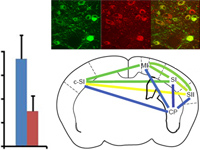De novo heterozygous loss-of-function mutations in phosphatase and tensin homolog (PTEN) are strongly associated with autism spectrum disorders; however, it is unclear how heterozygous mutations in this gene affect different cell types during human brain development and how these effects vary across individuals. Here, we used human cortical organoids from different donors to identify cell-type specific developmental events that are affected by heterozygous mutations in PTEN. We profiled individual organoids by single-cell RNA-seq, proteomics and spatial transcriptomics and revealed abnormalities in developmental timing in human outer radial glia progenitors and deep-layer cortical projection neurons, which varied with the donor genetic background. Calcium imaging in intact organoids showed that both accelerated and delayed neuronal development phenotypes resulted in similar abnormal activity of local circuits, irrespective of genetic background. The work reveals donor-dependent, cell-type specific developmental phenotypes of PTEN heterozygosity that later converge on disrupted neuronal activity.
